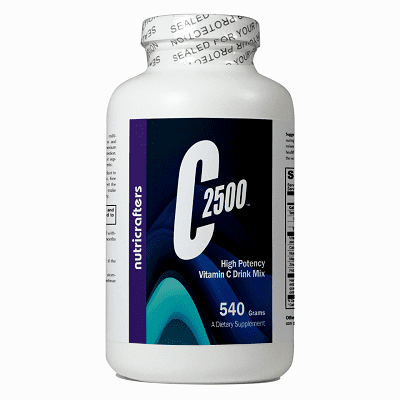Vitamin C, also known as ascorbic acid, is an essential nutrient that plays a crucial role in many functions within the body.
There are some best practices to consider when taking vitamin C, and some types of vitamin C you should avoid. Read on to get the inside scoop on the best forms of vitamin C to support your health and longevity.

Here are some of the benefits that vitamin C provides:
- Boosts immune system: Vitamin C helps support the immune system by stimulating the production of white blood cells.
- Acts as an antioxidant: Vitamin C is a powerful antioxidant that helps protect cells from damage caused by harmful molecules known as free radicals.
- Improves iron absorption: Vitamin C helps the body absorb iron from plant-based sources, which is especially important for vegetarians and vegans.
- Enhances skin health: Vitamin C is important for the production of collagen, a protein that helps keep skin healthy, firm, and supple.
- Supports healthy blood pressure: Vitamin C may help improve endothelial function, which is the ability of blood vessels to dilate and contract in response to changes in blood flow.
- Support mood, memory and cognition: Vitamin C is involved in the synthesis of neurotransmitters, which are chemical messengers that transmit signals between neurons in the brain.
- Supports energy production: Vitamin C plays a role in the synthesis of carnitine, a compound that helps transport fatty acids into the mitochondria (the “powerhouses” of cells) to be converted into energy. Without enough carnitine, the body may have difficulty producing energy.
- Supports physical fitness: Vitamin C is necessary for the production of collagen, a protein that provides structure and support to tissues throughout the body, including the skin, bones, and muscles. Maintaining healthy collagen levels can help support physical activity and energy levels.
There have been thousands of studies published on vitamin C and human health over the years. A search for “vitamin C” on the PubMed database, which is a comprehensive source of biomedical literature, yields over 54,000 results as of the end of 2022. These studies cover a wide range of topics, including the role of vitamin C in cardiovascular function, brain health, healing, skin health, and many others.
Here are a few examples of the types of studies that have shown a potential benefit of vitamin C in supporting healthy living:
- Cardiovascular health: A search for “vitamin C” and “cardiovascular” on the PubMed database yields over 5,000 results, with many studies showing a potential benefit of vitamin C for supporting cardiovascular health, improving endothelial function, and maintaining blood pressure.
- Immune function: A search for “vitamin C” and “immune function” on the PubMed database yields over 2,000 results, with many studies showing a potential benefit of vitamin C for maintaining healthy immune function.
- Skin health: A search for “vitamin C” and “skin health” on the PubMed database yields over 1,000 results, with many studies showing a potential benefit of vitamin C for reducing the appearance of wrinkles, improving skin hydration, and protecting against UV damage.
The dosage of vitamin C used in these studies varies depending on the study. Here are some examples:
- In the meta-analysis of 21 clinical trials on the common cold, doses of vitamin C ranged from 0.25 grams (250 milligrams) per day to 8 grams (8,000 milligrams) per day, with a median dose of 1 gram (1,000 milligrams) per day.
- In the study on interferon-alpha production, participants received a single dose of 1 gram (1,000 milligrams) of vitamin C.
- In the Cochrane review of 12 randomized controlled trials, doses of vitamin C ranged from 0.2 grams (200 milligrams) per day to 8 grams (8,000 milligrams) per day.
It’s important to note that high doses of vitamin C can cause gastrointestinal side effects in some people, such as diarrhea and stomach cramps. The recommended dietary allowance (RDA) for vitamin C is 75-90 milligrams per day for adults, and doses of up to 2,000 milligrams per day are generally considered safe for most people. However, anyone considering taking high doses of vitamin C should talk to their healthcare provider first.
Vitamin C is acidic and can cause gastrointestinal discomfort. This can be avoided by taking vitamin C in a buffered form. consuming vitamin C throughout the day will maximize benefit. NutriCrafters makes a buffered and sugar free drink mix with a hint of sweet key-lime. It is buffered with calcium, potassium and magnesium; avoiding the sodium usually used to buffer vitamin C.
In addition to avoiding too much non-buffered vitamin C, it is especially important to avoid tablets containing pure vitamin C. Tablets can be slow to dissolve causing the release of acid in the lower digestive tract.
NutriCrafters C-2500 was designed to to allow for high daily intake of vitamin C with 2,500 milligrams per teaspoon. Taking smaller amounts is always an option and provides a very cost effective way to supplement with vitamin C.

